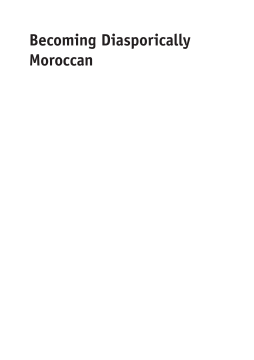
Additional Information
Book Details
Abstract
Questions persist about post-migrant generations and their sense of belonging in one homeland or another. As descendants of migrants, ‘second’ and further generations often struggle to establish an unproblematic belonging in/to a resident homeland, as the place where they live and work but are often categorized as ‘outsiders’. Simultaneously, because of improving access to travel, they can also maintain a physical presence in an ancestral homeland. However, their encounters there may also problematize their sense of belonging. During their summertime visits to Morocco, the European-Moroccan participants in this ethnography repeatedly find themselves negotiating a sense of belonging in the ‘homeland’. This book analyzes how these negotiations take place in order to investigate how the categories of ‘diasporic’ and ‘Moroccan’ become shaped by the interactional encounters observed. In the setting of Morocco, where trajectories to and from Europe have colored several centuries of history, this book provides a framework to explore how migration and return become incorporated into contemporary ‘Moroccanness’.
This book brings much needed attention to the multi-centered experiences of migration, as social actors interact with and negotiate belonging with those in their families’ 'home' society. Deftly combining fine-grained attention to broader ethnographic context as well as to participants’ embodied interactional practices, this book is a must-read for those interested in questions of migration and identity.
By presenting the interviews as spontaneous as they are, Wagner manages masterfully to translate the complex issues of identity triggered upon diasporic Moroccans meeting the local ones. Presenting the struggle of the diaspora to one more time assimilate with the local community and blend in at any cost, Wagner not only reminds us about the importance of identity but also of the urge to belong and have a place to call home.
Marina Ivanovic, University of Malta, Malta
This book draws a fascinating ethnography of the summer holidays in Morocco. Focusing on marketplaces and public spaces, Lauren Wagner shows how immigrants returning to their homeland from Europe deal with their ‘diasporic-Moroccanness’ and offers innovative insights about how ongoing fluid and transformative categorization processes are experienced and negotiated through multilingualism and embodiment.
Wagner offers a new and authentic look at the relationship between language, body and identity in the case of the Moroccan diaspora. Crossing borders and languages, the author uses a combination of sociolinguistics, linguistic anthropology and semiology to understand the fluidity of identity categorisations and dynamics of multimodal interactions in multicultural contexts.
Lauren Wagner is Assistant Professor in Globalisation and Development, Maastricht University, The Netherlands. She is co-convener of the Anthropology of Mobilities network, European Association of Social Anthropologists. Her research focuses on embodied practices and diasporic mobilities.
Table of Contents
| Section Title | Page | Action | Price |
|---|---|---|---|
| Contents | v | ||
| Acknowledgments | vii | ||
| Transcription Conventions | ix | ||
| Introduction | 1 | ||
| 1 Pathways and Backgrounds | 8 | ||
| 2 Integrating Theory and Method | 28 | ||
| 3 Defining the Category‘Moroccan’: Embodied Misrecognitions and Dynamics of Passing | 57 | ||
| 4 Bargaining for‘Moroccanness’: Categorial Work on the Market | 93 | ||
| 5 A New Category? Becoming ‘Diasporically-Moroccan’ | 127 | ||
| Conclusion: Assembling Diasporicness | 153 | ||
| Bibliography | 159 | ||
| Index | 174 |
